
Back in the pre-Stonewall decade when Anton Kilgallen and Sandy Sonnenberg were in their twenties, there were basically two choices for big city gay men. Anton opted for the first, living as “openly” as was possible in the underground world of illegal gay bars and private parties. Sandy chose the second, attempting a pseudo-straight lifestyle by marrying someone of the opposite sex and doing his best to repress whatever same-sex urges might threaten to erupt.
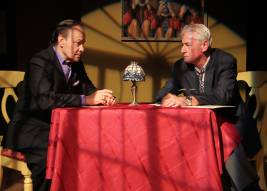 Playwright Jon Robin Baitz explores these two very different lifestyle choices—and their consequences over the course of four decades—in his provocative 2004 play The Paris Letter, not seen in Los Angeles since its World Premiere engagement at the Kirk Douglas Theatre, and therefore a major programming coup for the usually play-it-safe Lonny Chapman Group Repertory Theatre. Directed by the one-and-only Jules Aaron, the result is about as fine a production as you’ll see on an intimate L.A. stage this or any year.
Playwright Jon Robin Baitz explores these two very different lifestyle choices—and their consequences over the course of four decades—in his provocative 2004 play The Paris Letter, not seen in Los Angeles since its World Premiere engagement at the Kirk Douglas Theatre, and therefore a major programming coup for the usually play-it-safe Lonny Chapman Group Repertory Theatre. Directed by the one-and-only Jules Aaron, the result is about as fine a production as you’ll see on an intimate L.A. stage this or any year.
The Paris Letter opens quite literally with a bang, with 60something Sandy (Larry Eisenberg) in a fevered embrace with young Burt Sarris (Alex Parker), the financial wunderkind whose attempt to plug holes in a high-risk, high-investment scheme have bankrupted multi-millionaire financier Sandy and left Burt with no other option than to pull out a gun.
Segue to seventyish Anton (Lloyd Pedersen), flamboyantly, fabulously gay and our guide to the parallel stories about to unfold.
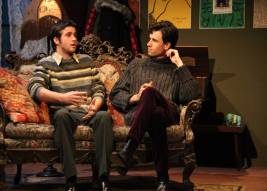 The early ‘60s give us Young Anton (Parker), his 20something self and owner of the bohemian restaurant Le Singe D’Or, so irresistibly attractive to big business scion Young Sandy (Dan Sykes) that an evening at the cinema ends up with the two in a passionate liplock.
The early ‘60s give us Young Anton (Parker), his 20something self and owner of the bohemian restaurant Le Singe D’Or, so irresistibly attractive to big business scion Young Sandy (Dan Sykes) that an evening at the cinema ends up with the two in a passionate liplock.
We also meet duo’s late ‘90s selves: Sandy, married for over twenty years to Anton’s longtime friend restauranteuse Katie Arlen (Julia Silverman) and stepfather to her son Sam, and Anton, who has (as Sandy puts it) spent the past thirty-five years living through his friends, that is when not having sex with hustlers, “and boyfriends now and then, with whom the sex life lifts, and then sinks.”
Which of the two has led the more honest life? Whose life has been the happier one? Would either of them have made the same life choices had they been born several decades later, like Katie’s schoolteacher son Sam (Sykes), handsome, scruffy, tattooed, and entirely comfortable in his openly gay skin?
These are the questions posed by playwright Baitz (author of last year’s Best Play Tony nominee Other Desert Cities and creator-executive producer of TV’s Brothers & Sisters) in The Paris Letter, riveting from start to finish, and as thought (and conversation)-provoking a play as you’re likely to see anytime soon.
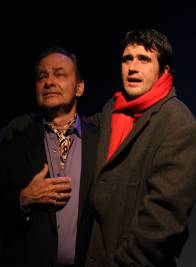 The ensemble assembled by Aaron could hardly be better, beginning with Pedersen, the only principal cast member not essaying a different role in each of the play’s two time frames. Frequently breaking the fourth wall to address the audience with flamboyant panache and razor-sharp wit, the longtime Group Rep member delivers a delightful, multicolored, touching performance that is surely one of his best.
The ensemble assembled by Aaron could hardly be better, beginning with Pedersen, the only principal cast member not essaying a different role in each of the play’s two time frames. Frequently breaking the fourth wall to address the audience with flamboyant panache and razor-sharp wit, the longtime Group Rep member delivers a delightful, multicolored, touching performance that is surely one of his best.
Eisenberg is equally memorable as the complex bundle of contradictions that is Sandy, a man whose financial success and seemingly happy marriage mask a lifetime of repressed desires. Doubling in flashback sequences as Dr. Moritz Schiffman, the reparative therapist young Sandy takes to seeing five times a week in an effort to “cure” his homosexuality, Eisenberg returns opposite a tormented Sykes in one of the production’s strongest scenes, still relevant in 2012 as men like Marcus Bachmann make amply clear.
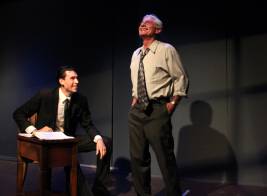 Both Parker and Sykes do remarkable work as Anton’s and Sandy’s younger selves, a pair of characterizations perfectly in sync with Pedersen’s and Eisenberg’s quirks and mannerisms. Not only that, but the dynamic duo create entirely distinct characters for Parker’s headstrong Burt and Sykes’ edgy Sam, in addition to scoring points for being entirely comfortable in their own skins in an arguably gratuitous full frontal nude scene sure to swell audience numbers.
Both Parker and Sykes do remarkable work as Anton’s and Sandy’s younger selves, a pair of characterizations perfectly in sync with Pedersen’s and Eisenberg’s quirks and mannerisms. Not only that, but the dynamic duo create entirely distinct characters for Parker’s headstrong Burt and Sykes’ edgy Sam, in addition to scoring points for being entirely comfortable in their own skins in an arguably gratuitous full frontal nude scene sure to swell audience numbers.
As the sole female amongst the quartet of male players, Silverman gets two great parts to sink her teeth into … sensationally. In the present day, she is Sandy’s devoted wife, whose discovery of her husband’s financial and sexual shenanigans gives Silverman ample opportunity to strut her dramatic stuff. In the ‘60s, she is Sandy’s fabulous bouffant blonde-tressed mother Lillian, whose recollections of a young cousin’s shock treatment and eventual suicide testify to reparative therapy at its most destructive.
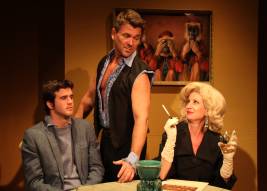 Paul Cady completes the cast in a pair of hunky waiter cameos.
Paul Cady completes the cast in a pair of hunky waiter cameos.
Chris Winfield’s set design looks terrific, with its gray panels sliding to reveal at different times Le Singe D’Or and Brasserie Arlen, Anton’s plush apartment, and the Sonnenberg home, attentively decorated by prop mistress Michele Bernath. Liz Nankin’s costumes suit characters and eras to T, expertly lit by J. Kent Inasy, whose lighting design includes some great light-and-shadow effects. Steve Shaw’s sound design and Max Kinberg’s original music provide just the right underscoring. Sherry Netherland is assistant director, Patrick Burke producer for Group Rep, and Mateas Ponce stage manager.
The current staging proves problematic only in the play’s first scene, forcing a character who has just offed himself to then rise as if from the dead and exit, a suspension-of-disbelief moment that proves jarring. Also, though Baitz’s stage directions indicate that the audience should be aware of a mysterious witness to said suicide (a moment key to a later revelation), as currently staged, there seems to be no one present but the trigger puller.
These are, however, minor quibbles in a production as all-around outstanding as this one, certain to attract audiences who have never seen a Group Rep production as well as challenge Group Rep regulars with something edgier than the ordinary. Though the original Los Angeles production would be a hard act for any intimate staging to follow, follow it this one does, and quite exceptionally indeed.
Lonny Chapman Theatre, 10900 Burbank Boulevard, North Hollywood.
www.thegrouprep.com
–Steven Stanley
July 28, 2012
Photos: Sherry Netherland


 Since 2007, Steven Stanley's StageSceneLA.com has spotlighted the best in Southern California theater via reviews, interviews, and its annual StageSceneLA Scenies.
Since 2007, Steven Stanley's StageSceneLA.com has spotlighted the best in Southern California theater via reviews, interviews, and its annual StageSceneLA Scenies.







 COPYRIGHT 2024 STEVEN STANLEY :: DESIGN BY
COPYRIGHT 2024 STEVEN STANLEY :: DESIGN BY